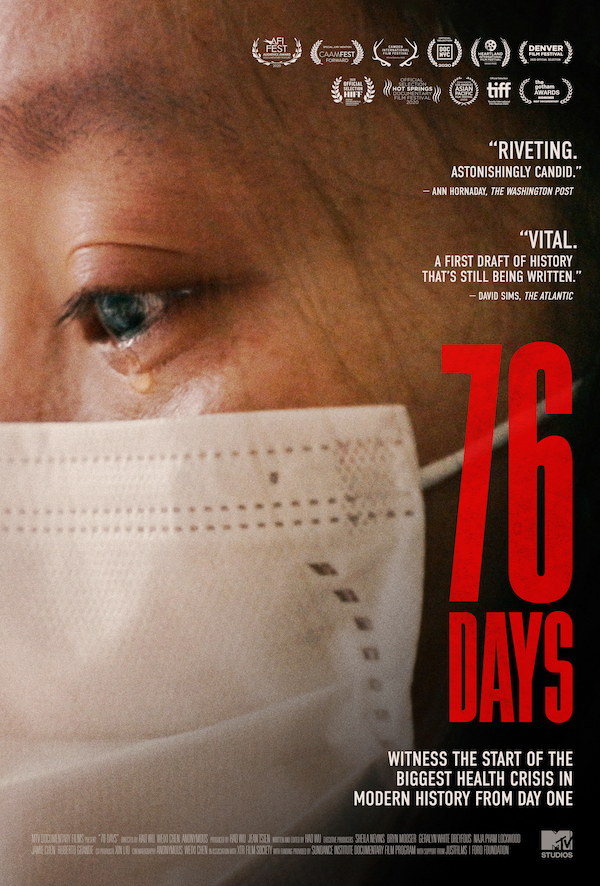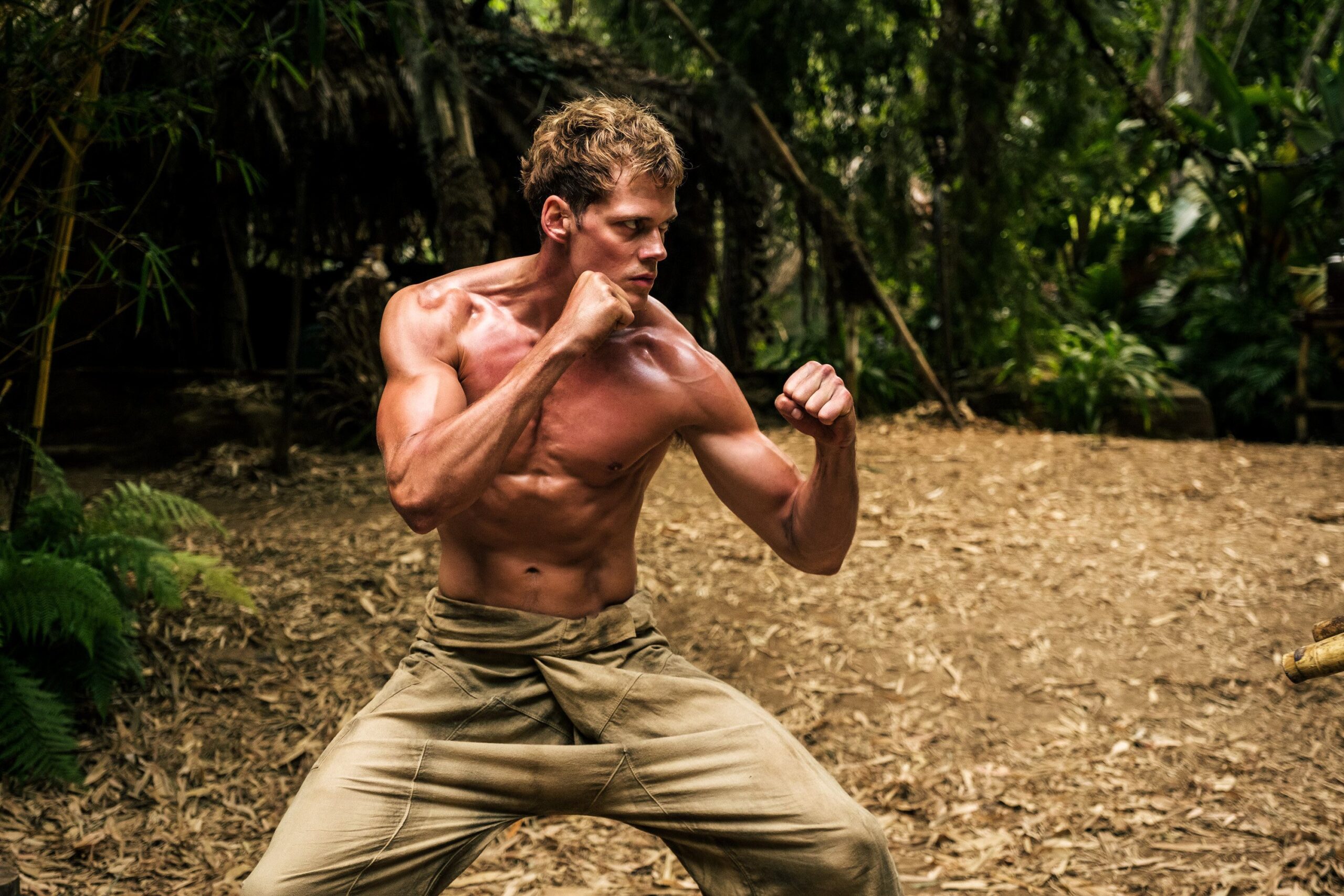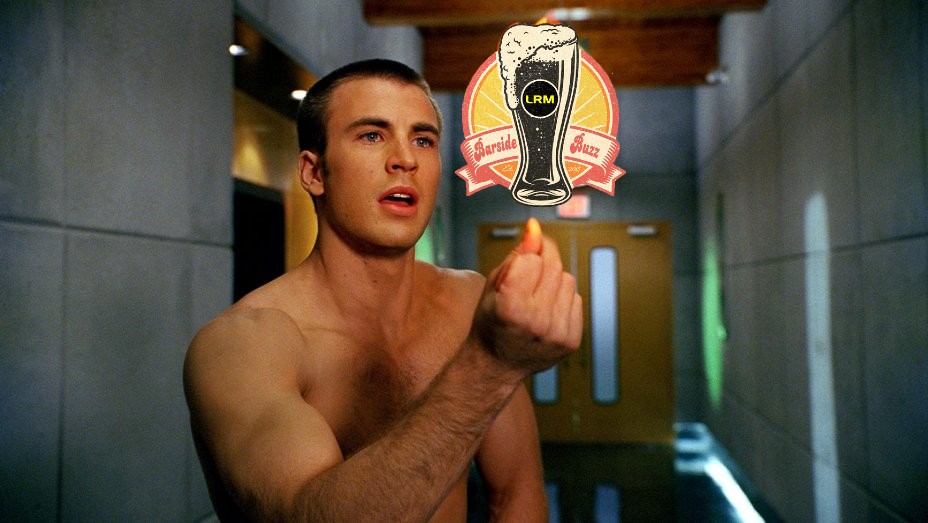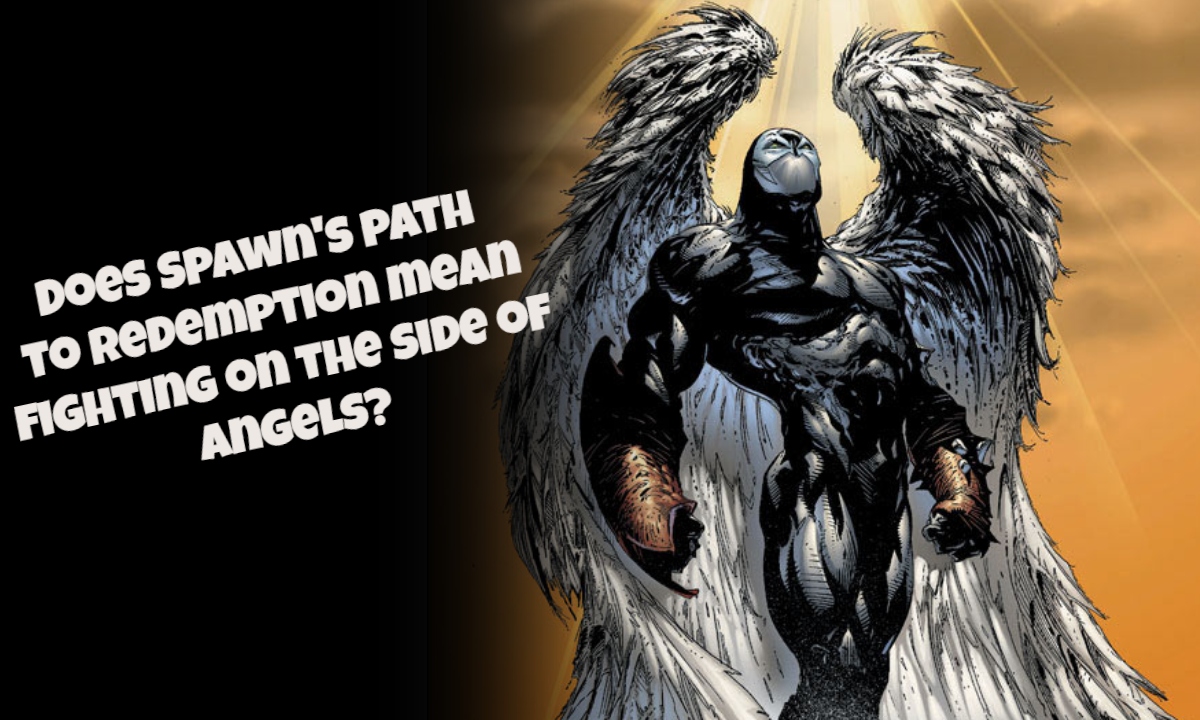The COVID-19 Pandemic will be remembered as one of the most tense periods in history. While we are deep into the pandemic it seems that the origins has been convoluted with misinformation. Doctors and historians will analyze this moment for years to come. Luckily there was a crew available to document the beginning of the pandemic in Wuhan, China. Hao Wu and a brave crew documented the beginning of the COVID-19 Pandemic and now are premiering the documentary this Friday.
The Synopsis
On January 23rd, 2020, China locked down Wuhan, a city of 11 million, to combat the emerging COVID-19 outbreak. Set deep inside the frontlines of the crisis in four hospitals, 76 DAYS tells indelible human stories at the center of this pandemic—from a woman begging in vain to bid a final farewell to her father, agrandfatherwith dementia searching for his way home, a couple anxious to meet their newborn, to a nurse determined to return personal items to families of the deceased. These raw and intimate stories bear witness to the death and rebirth of a city under a 76-day lockdown, and to the human resilience that persists in times of profound tragedy.
I had the amazing opportunity to speak with the filmmaker, Hao Wu about this unbelievable documentary. He shared the journey in the making.
Nancy Tapia: Congratulations. You were the writer, editor, co-directed and co-produced of 76 Days. Which part would you say was the most challenging out of the four?
Hao Wu: For me, I think the most challenging is the editing, but for the entire film. Obviously the production was the most important, right? I mean, what’s making this film so unique and special is the phone line footage. That’s so raw and so emotional that my co-directors (Anonymous and Weixi Chen) captured it. In terms of my own role, I think it’s the editing because my two co-directors, they obviously didn’t know each other when they were filming. They were filming completely separately and from different hospitals. Not only there’s a stylistic difference, in terms of obtaining the footage they shot, but also in terms of how to tell the story. It took me a while to reach this decision to just simply get used to being observational and really direct-cinema approach to tell the story.

Nancy Tapia: I have to say for your editing, you did great. I didn’t know that it took place in different hospitals.
Hao Wu: Yeah. I mean, I made it with two to four different hospitals, but in the end it really doesn’t make a difference… I think either you think it’s one hospital or multiple hospitals, but it doesn’t make a difference because this film is really a good portrait. It’s a tribute to the group of people, right? The frontline worker, medical workers, as well as the patient who helped each other to survive.
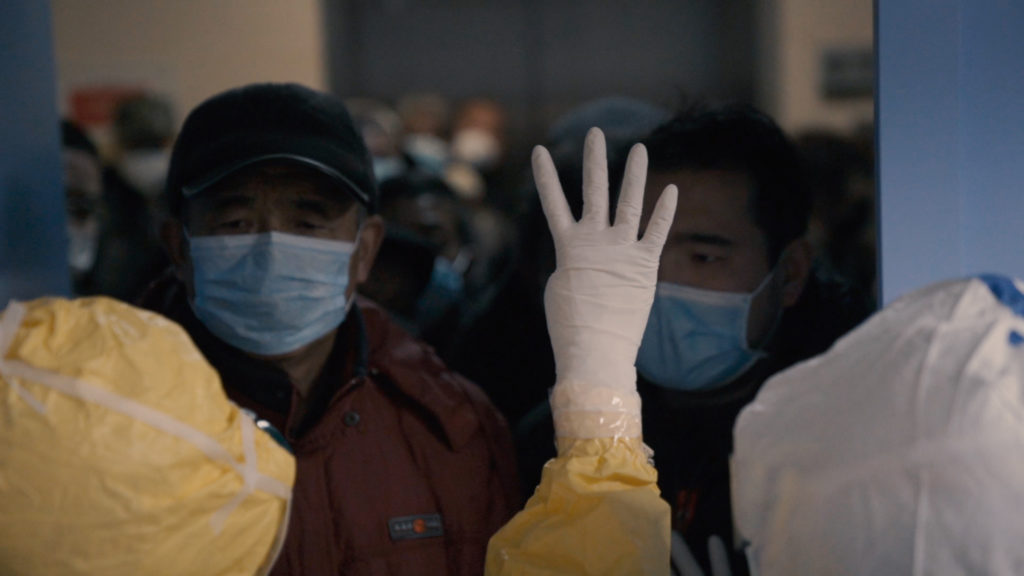
Nancy Tapia: It was very sad in the first part. You see how chaotic it was and the desperation of people wanting to get in. There’s no security. The medical staff is pretty much doing it all.
Hao Wu: Yeah, at the beginning of the outbreak, it was absolute chaos. I mean, the patients were rushing in, right? As shown in the film and the medical workers, they have no idea, they were making up as they go. But obviously the film didn’t go into that kind of detail to describe how they prepare. The film is more telling the emotional art of the survival of the city and the hospitals.
Nancy Tapia: There was a doctor talking about wanting to be there. Volunteering to be there because it’s a hero’s dream. It was definitely a another perspective to see.
Hao Wu: I think even here, I remember back in April, maybe middle, late April when New York needed a lot of doctors. There were also nurses and doctors who volunteered to come to New York. I think in any country because COVID is so special. It’s one of the largest public health crises in modern history. So yeah, I think there’s definitely in every country, they are a group of people who volunteer to step up to the plate, to try to help support each other.
Nancy Tapia: You had a few, I guess I can kind of say “characters,” patients that are followed throughout the documentary. You have this older man that was very resistant to staying put. At the end he was actually happy to be there and they made him feel at home. It was heartbreaking to hear his son didn’t want to pick him up because he was paranoid he would still have COVID.
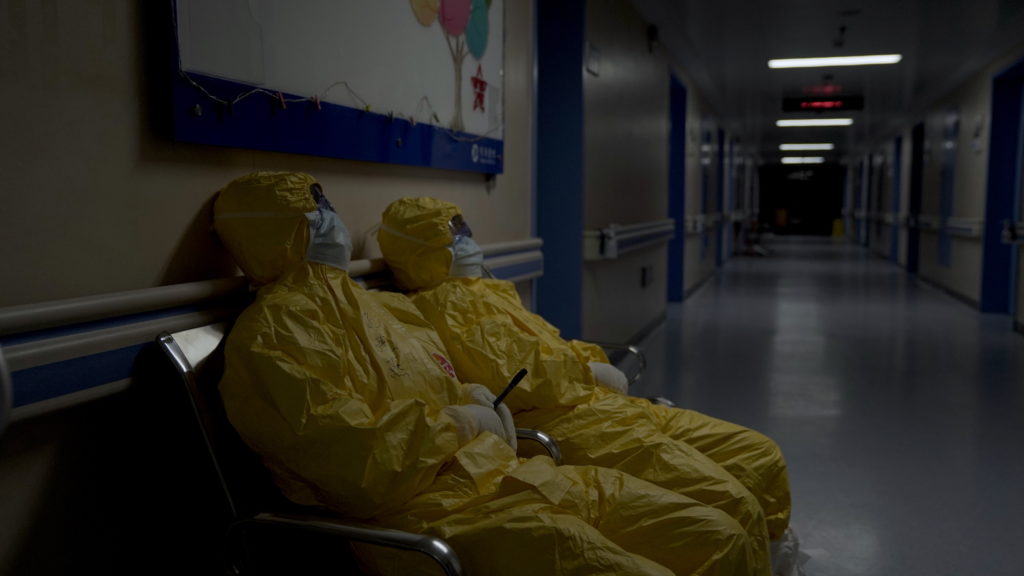
Also Check Out: Half Brothers: Luke Greenfield Breaks The Cliché About Mexico With Humor [Exclusive Interview]
Hao Wu: Yeah. I think that’s real life. So it’s not just all positive stories, right? Obviously in the hospital, even with the old grandpa, the medical workers wanted the police to take him away. The real story is that they couldn’t pick him up because he was positive with COVID. And then later on, his whole family isn’t necessarily coming back and then he found his surrogate family in the hospital. So I guess it’s just the complexity of human life. What are our families, who can be nice to us? It’s not certain, a pandemic can help reveal that.
Nancy Tapia: This documentary goes deep and gives you a taste of what the medical workers went through int he early stages of the pandemic. They did it all, from being their own security, providing medical care to turning into therapists and caretakers.
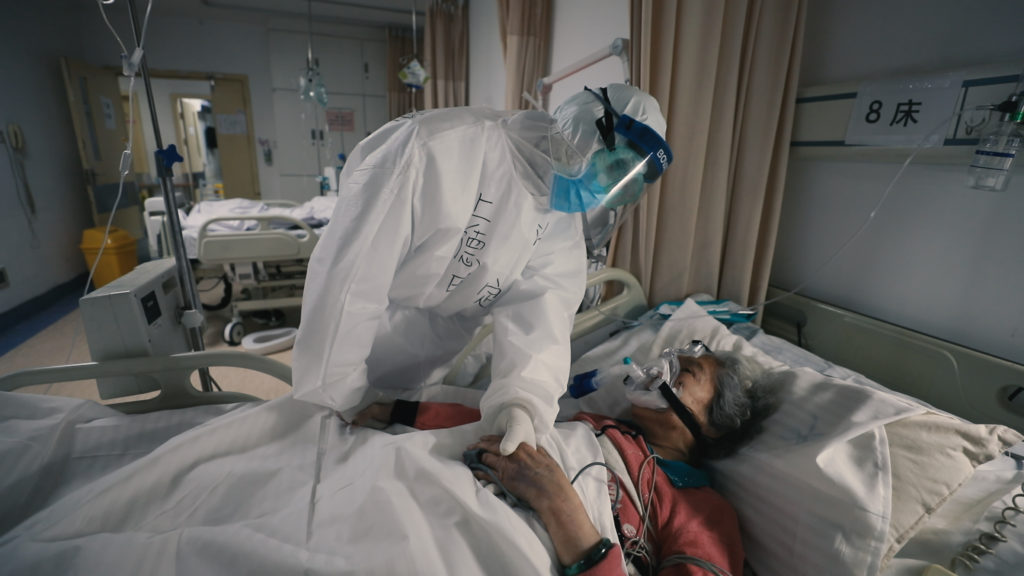
Hao Wu: Exactly!
Nancy Tapia: I found fascinating the display of the process they went through to gear up and gear down. So many steps, how long was that process?
Hao Wu: You’d just see them in the beginning to have to fill up and all the opening. That was in the beginning, early February when little was known about how dangerous, how transmissible, and how hostile the virus was so they were trying to fill up everything. Every opening from the clothes from the suit. I’m trying to think, I’ve never actually counted. I think it takes about 30 minutes to an hour to suit up each time because they have to help each other examine their time. These are all, I think, that there’s a lot more, definitely a lot less careful later on because once we have more data to show how it’s transmitted. I think they were less stringent with the suiting up process.
Also Check Out: Ana De La Reguera Talks About Pantaya’s Celebremos: Eterna Navidad [Exclusive Interview]
Nancy Tapia: That’s quite a bit of time when you can be saving lives, right?
Hao Wu: Yeah, but then they definitely work in shifts. Obviously there’s always people inside the contamination zone to watch the patient.
Nancy Tapia: I understand that you were not at any of these hospitals right? You had other people fiming.
Hao Wu: That’s right.
Nancy Tapia: How did this whole process even initiate without you being present?
Hao Wu: Yeah. It’s a long convoluted story because usually I don’t like to take in newsy topics because that’s the only way that is still well covered by the news media.
But this time COVID has become really personal for two reasons. One is my partner and I, we were planning to take our kids from New York to Shanghai for Chinese New Year on January 23rd. 24 hours before our departure flight, we learned about the lockdown, 10 hours down to the lockdown. So in the end, we had to cancel the ticket for my partner and my kids.
I flew to Shanghai myself for Chinese New Year with my sister, family and my parents. It was a really confusing time because as soon as Wuhan was put under lockdown, the entire country of China also went into voluntary lockdown. Because people were scared about this virus and nobody was going out. Shanghai being China’s largest city of 21 million people, there was nobody on the street. It was eerie walking outside, just feeling like walking in a movie, on the set of Walking Dead.
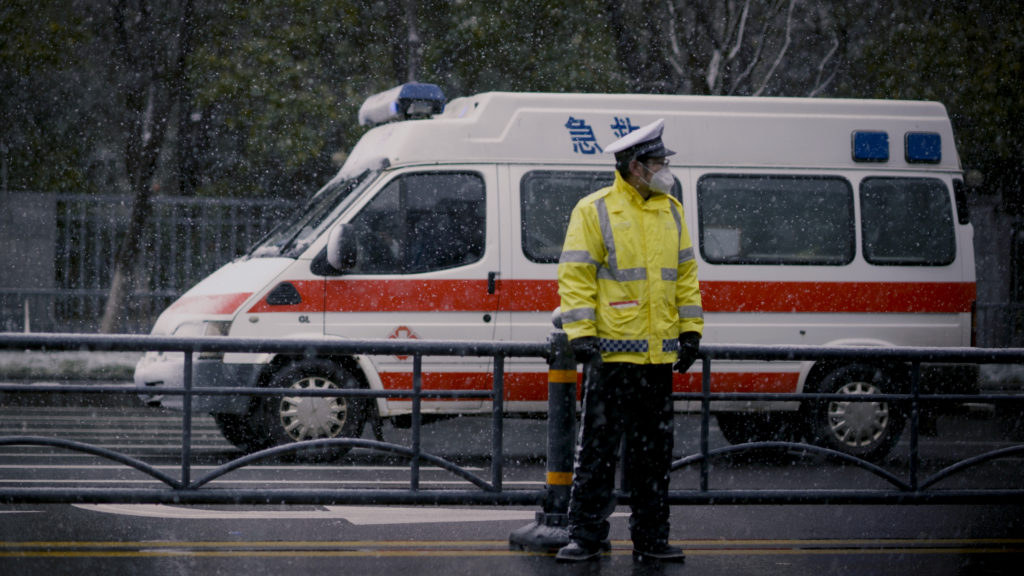
I’m doing the Chinese New Year, just scrolling on, looking on our phone, trying to figure out what happened. Also I was really worried that both of my parents have late stage cancer. I didn’t know when they be able to see their grandkids again. There was a lot of sadness in us because we had put so much anticipation in terms of taking the kids back so we can have time together for the holidays. So as soon as I came back to the US, when the US network approached me to make a film about the coronavirus, but it was not a pandemic. It was not officially declared as a pandemic. So I just jumped in because I really wanted to find out more about this coronavirus outbreak.
Secondly, my grandfather, soon after he was diagnosed with late stage liver cancer and he passed away a month later. Because of the COVID-19, travel restrictions between US and China, I couldn’t even go back to say goodbye to him. I think everybody has a personal connection and coping mechanism as the virus has affected almost everyone in the world. But for me, I just feel very strongly, like I needed to make a film because of these personal reasons. So I reached out to filmmakers and started filming on the grounds in Wuhan. I talked to over a dozen of medical staff that shared footage with me. But as soon as I saw the footage shot by my two co-directors, eventually who later told me he was my co-direct and saw the footage from them, I was like, “I really want to work with you guys.” And that’s how the conversation got started.
Nancy Tapia: Well, I’m sure people are going to be taken them back to the beginning of this year with this documentary. They will appreciate how much easier they had it versus others, especially in the medical field.
Hao Wu: Yeah…
Nancy Tapia: Thank you so much for your time and discussing 76 Days. Congratulations on the film being in film festivals already and the shortlisted award for Best Feature, International Documentary Association 2020.
Hao Wu: Thank you so much.
76 Days has been showcased at the Toronto International Film Festival 2020 (World Premiere), Zurich Film Festival 2020, Camden International Film Festival 2020, Heartland Film Festival 2020 (Grand Jury Prize), Double Exposure Film Festival (Opening Night), AFI Fest 2020, DOC NYC 2020 (Best Cinematography, Short List).
76 Days launches in Virtual Cinemas Nationwide Beginning Friday, December 4

 FOR FANBOYS, BY FANBOYS
Have you checked out LRM Online’s official podcasts and videos on The Genreverse Podcast Network? Available on YouTube and all your favorite podcast apps, This multimedia empire includes The Daily CoG, Breaking Geek Radio: The Podcast, GeekScholars Movie News, Anime-Versal Review Podcast, and our Star Wars dedicated podcast The Cantina. Check it out by listening on all your favorite podcast apps, or watching on YouTube!
Subscribe on: Apple Podcasts | Spotify | SoundCloud | Stitcher | Google Play
FOR FANBOYS, BY FANBOYS
Have you checked out LRM Online’s official podcasts and videos on The Genreverse Podcast Network? Available on YouTube and all your favorite podcast apps, This multimedia empire includes The Daily CoG, Breaking Geek Radio: The Podcast, GeekScholars Movie News, Anime-Versal Review Podcast, and our Star Wars dedicated podcast The Cantina. Check it out by listening on all your favorite podcast apps, or watching on YouTube!
Subscribe on: Apple Podcasts | Spotify | SoundCloud | Stitcher | Google Play

